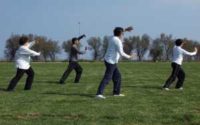22 Mar Tai Chi At Least As Beneficial As Standard Therapy For Fibromyalgia
MedicalResearch.com Interview with:
 Chenchen Wang MD, MSc
Chenchen Wang MD, MSc
Professor of Medicine
Tufts University School of Medicine
Director, Center For Complementary And Integrative Medicine
Division of Rheumatology
Tufts Medical Center Boston, MA 02111
MedicalResearch.com: What is the background for this study?
Response: Patients with chronic widespread pain often try many different types of pain medications, anti-depressants, physical therapy, and other approaches, and commonly find that none of these therapies work for them. Finding safe, effective approaches for pain management is an urgent priority. Previous evidence suggested that Tai Chi, a multi-dimensional mind-body practice that integrates physical, psychosocial, and behavioral elements, may be especially suited to address both chronic pain and associated psychological and somatic symptoms. In our most recent study published in the BMJ, we directly compared the effectiveness of Tai Chi versus aerobic exercise, which is a standard care non-drug treatment for fibromyalgia.
MedicalResearch.com: What are the main findings? : What should readers take away from your report?
Response: We found that Tai Chi provides similar or greater benefits compared to a standard care treatment (the current most commonly prescribed non-pharmacological treatment) for patients with fibromyalgia. We also found these therapeutic benefits were consistent across a diverse group of patients regardless of who the Tai Chi instructor was. This suggests that the intervention can be delivered in a wide variety of settings by appropriately trained instructors.
MedicalResearch.com: What recommendations do you have for future research as a result of this work?
Response: Future long term multicenter trials in community settings and different countries are warranted to assess the external validity of our study and better inform clinical practice. In addition, it is well documented that psychosocial variables play a pivotal role in the experience of pain and aberrant opioid taking behaviors. Tai Chi, which can address both the physical and psychological symptoms in chronic pain, may be particularly effective in targeting opioid use and misuse. Of note, both groups in this trial showed reduced use of analgesics over time. Future investigation of mind-body approaches should focus on how these therapies could help reduce the burden associated with long term use of opioid analgesia
Disclosures: The authors have no conflicts of interest or disclosures related to the work.
Citations:
Wang C, Schmid CH, Fielding RA, Harvey WF, Reid KF, Price LL, Driban JB, Kalish R, Rones R, McAlindon T. Effect of tai chi versus aerobic exercise for fibromyalgia: a comparative effectiveness randomised controlled trial. The BMJ. 2018, in press
http://www.bmj.com/content/360/bmj.k851
[wysija_form id=”3″]
The information on MedicalResearch.com is provided for educational purposes only, and is in no way intended to diagnose, cure, or treat any medical or other condition. Always seek the advice of your physician or other qualified health and ask your doctor any questions you may have regarding a medical condition. In addition to all other limitations and disclaimers in this agreement, service provider and its third party providers disclaim any liability or loss in connection with the content provided on this website.
Last Updated on March 22, 2018 by Marie Benz MD FAAD
